Organisational Behaviour – Ryaniar
VerifiedAdded on 2021/02/20
|16
|4503
|57
AI Summary
Contribute Materials
Your contribution can guide someone’s learning journey. Share your
documents today.
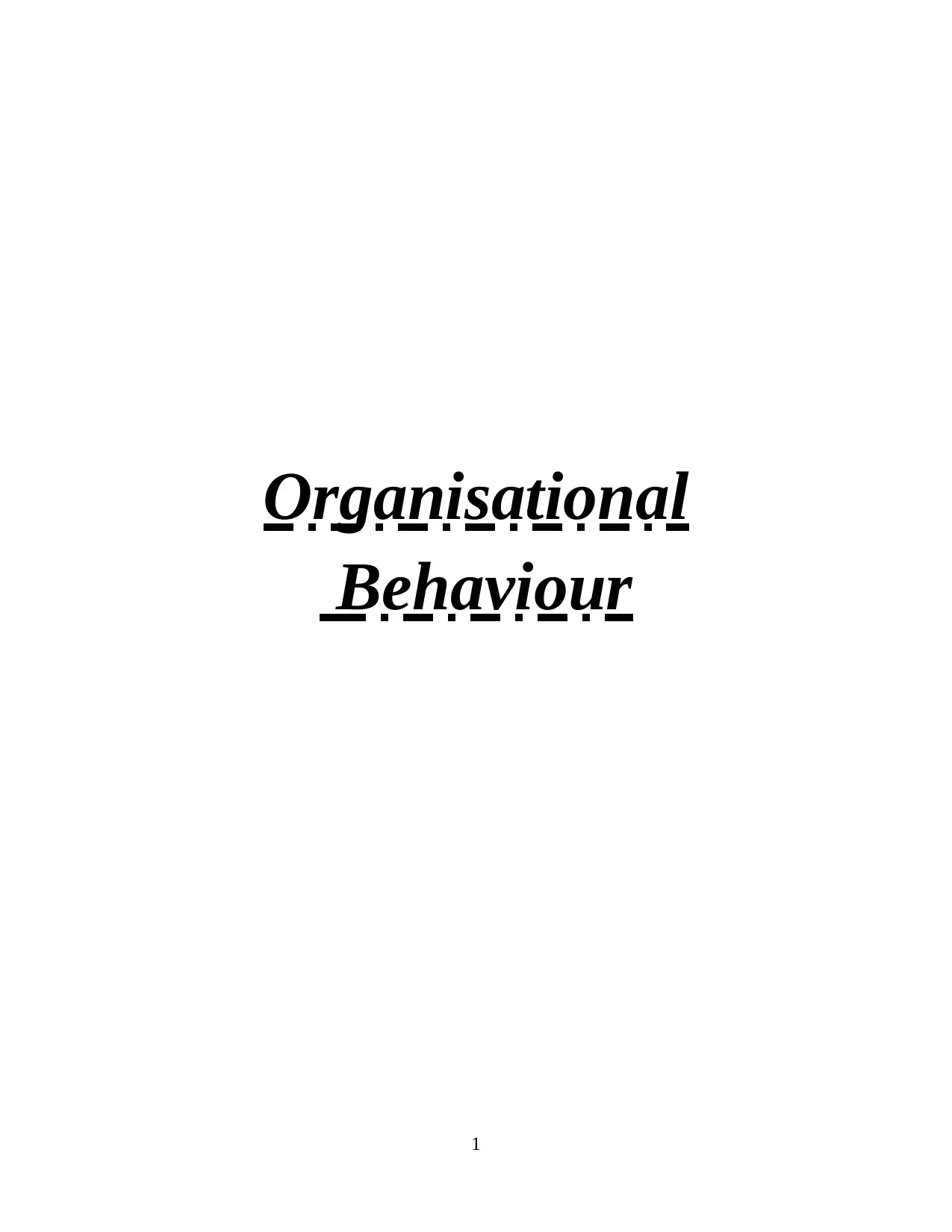
Organisational
Behaviour
1
Behaviour
1
Secure Best Marks with AI Grader
Need help grading? Try our AI Grader for instant feedback on your assignments.
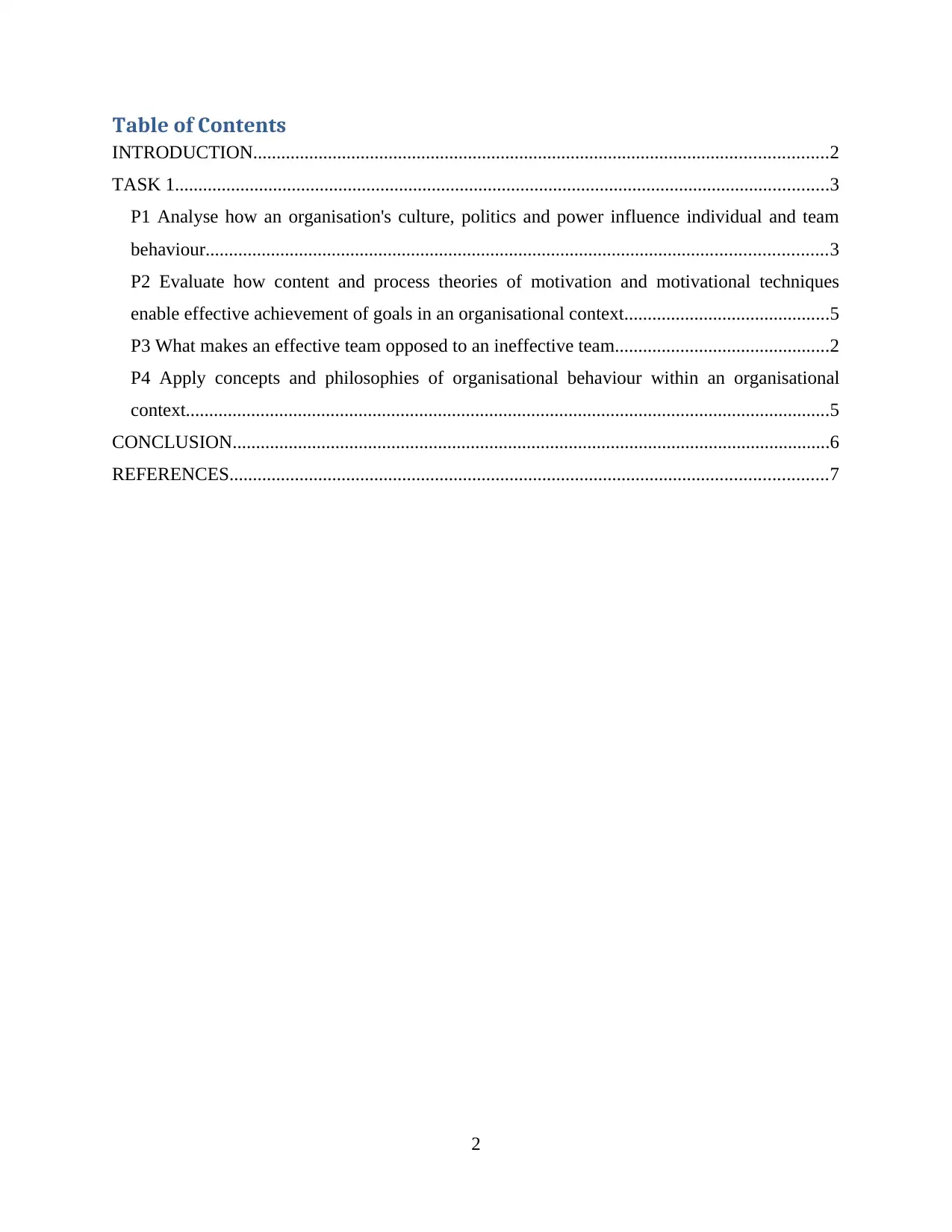
Table of Contents
INTRODUCTION...........................................................................................................................2
TASK 1............................................................................................................................................3
P1 Analyse how an organisation's culture, politics and power influence individual and team
behaviour.....................................................................................................................................3
P2 Evaluate how content and process theories of motivation and motivational techniques
enable effective achievement of goals in an organisational context............................................5
P3 What makes an effective team opposed to an ineffective team..............................................2
P4 Apply concepts and philosophies of organisational behaviour within an organisational
context..........................................................................................................................................5
CONCLUSION................................................................................................................................6
REFERENCES................................................................................................................................7
2
INTRODUCTION...........................................................................................................................2
TASK 1............................................................................................................................................3
P1 Analyse how an organisation's culture, politics and power influence individual and team
behaviour.....................................................................................................................................3
P2 Evaluate how content and process theories of motivation and motivational techniques
enable effective achievement of goals in an organisational context............................................5
P3 What makes an effective team opposed to an ineffective team..............................................2
P4 Apply concepts and philosophies of organisational behaviour within an organisational
context..........................................................................................................................................5
CONCLUSION................................................................................................................................6
REFERENCES................................................................................................................................7
2
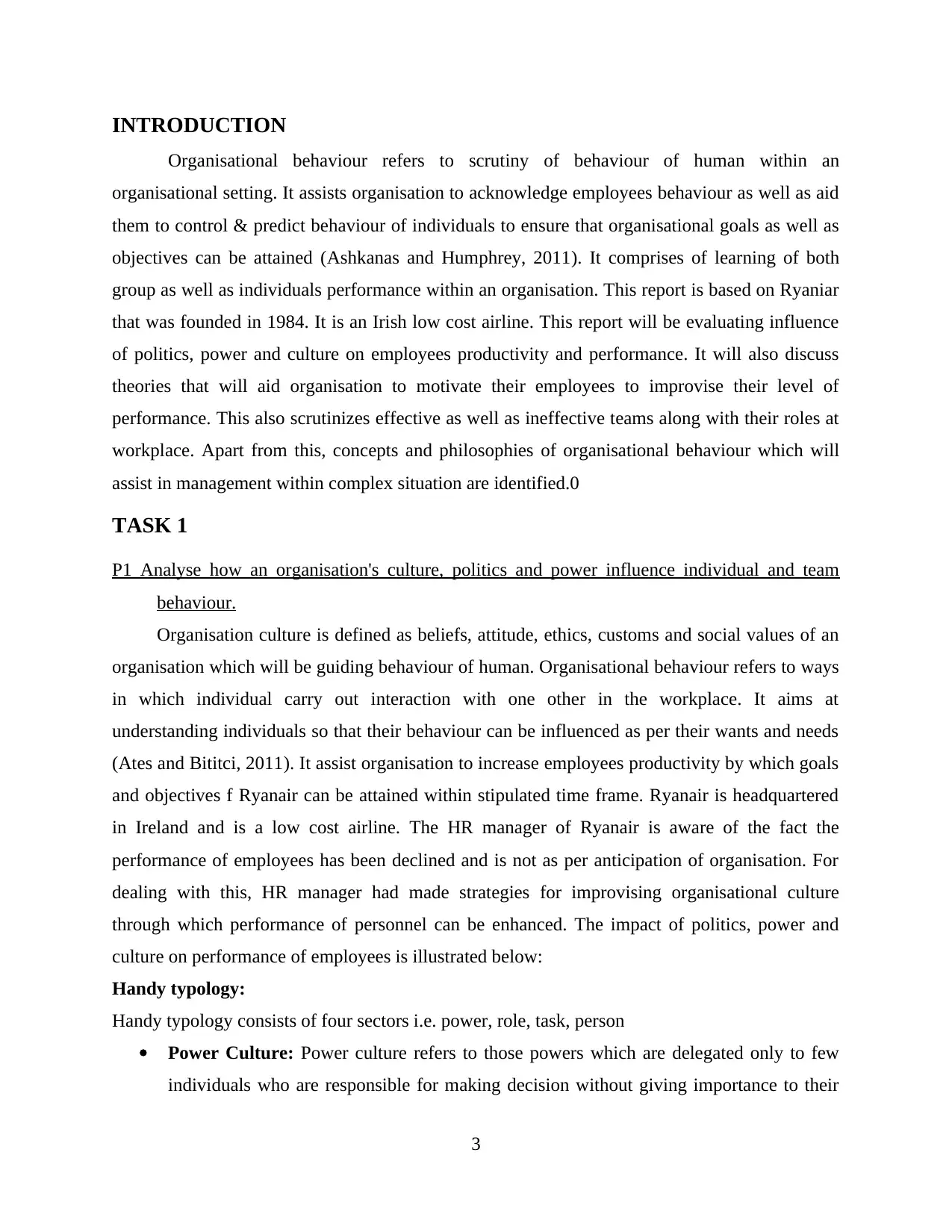
INTRODUCTION
Organisational behaviour refers to scrutiny of behaviour of human within an
organisational setting. It assists organisation to acknowledge employees behaviour as well as aid
them to control & predict behaviour of individuals to ensure that organisational goals as well as
objectives can be attained (Ashkanas and Humphrey, 2011). It comprises of learning of both
group as well as individuals performance within an organisation. This report is based on Ryaniar
that was founded in 1984. It is an Irish low cost airline. This report will be evaluating influence
of politics, power and culture on employees productivity and performance. It will also discuss
theories that will aid organisation to motivate their employees to improvise their level of
performance. This also scrutinizes effective as well as ineffective teams along with their roles at
workplace. Apart from this, concepts and philosophies of organisational behaviour which will
assist in management within complex situation are identified.0
TASK 1
P1 Analyse how an organisation's culture, politics and power influence individual and team
behaviour.
Organisation culture is defined as beliefs, attitude, ethics, customs and social values of an
organisation which will be guiding behaviour of human. Organisational behaviour refers to ways
in which individual carry out interaction with one other in the workplace. It aims at
understanding individuals so that their behaviour can be influenced as per their wants and needs
(Ates and Bititci, 2011). It assist organisation to increase employees productivity by which goals
and objectives f Ryanair can be attained within stipulated time frame. Ryanair is headquartered
in Ireland and is a low cost airline. The HR manager of Ryanair is aware of the fact the
performance of employees has been declined and is not as per anticipation of organisation. For
dealing with this, HR manager had made strategies for improvising organisational culture
through which performance of personnel can be enhanced. The impact of politics, power and
culture on performance of employees is illustrated below:
Handy typology:
Handy typology consists of four sectors i.e. power, role, task, person
Power Culture: Power culture refers to those powers which are delegated only to few
individuals who are responsible for making decision without giving importance to their
3
Organisational behaviour refers to scrutiny of behaviour of human within an
organisational setting. It assists organisation to acknowledge employees behaviour as well as aid
them to control & predict behaviour of individuals to ensure that organisational goals as well as
objectives can be attained (Ashkanas and Humphrey, 2011). It comprises of learning of both
group as well as individuals performance within an organisation. This report is based on Ryaniar
that was founded in 1984. It is an Irish low cost airline. This report will be evaluating influence
of politics, power and culture on employees productivity and performance. It will also discuss
theories that will aid organisation to motivate their employees to improvise their level of
performance. This also scrutinizes effective as well as ineffective teams along with their roles at
workplace. Apart from this, concepts and philosophies of organisational behaviour which will
assist in management within complex situation are identified.0
TASK 1
P1 Analyse how an organisation's culture, politics and power influence individual and team
behaviour.
Organisation culture is defined as beliefs, attitude, ethics, customs and social values of an
organisation which will be guiding behaviour of human. Organisational behaviour refers to ways
in which individual carry out interaction with one other in the workplace. It aims at
understanding individuals so that their behaviour can be influenced as per their wants and needs
(Ates and Bititci, 2011). It assist organisation to increase employees productivity by which goals
and objectives f Ryanair can be attained within stipulated time frame. Ryanair is headquartered
in Ireland and is a low cost airline. The HR manager of Ryanair is aware of the fact the
performance of employees has been declined and is not as per anticipation of organisation. For
dealing with this, HR manager had made strategies for improvising organisational culture
through which performance of personnel can be enhanced. The impact of politics, power and
culture on performance of employees is illustrated below:
Handy typology:
Handy typology consists of four sectors i.e. power, role, task, person
Power Culture: Power culture refers to those powers which are delegated only to few
individuals who are responsible for making decision without giving importance to their
3
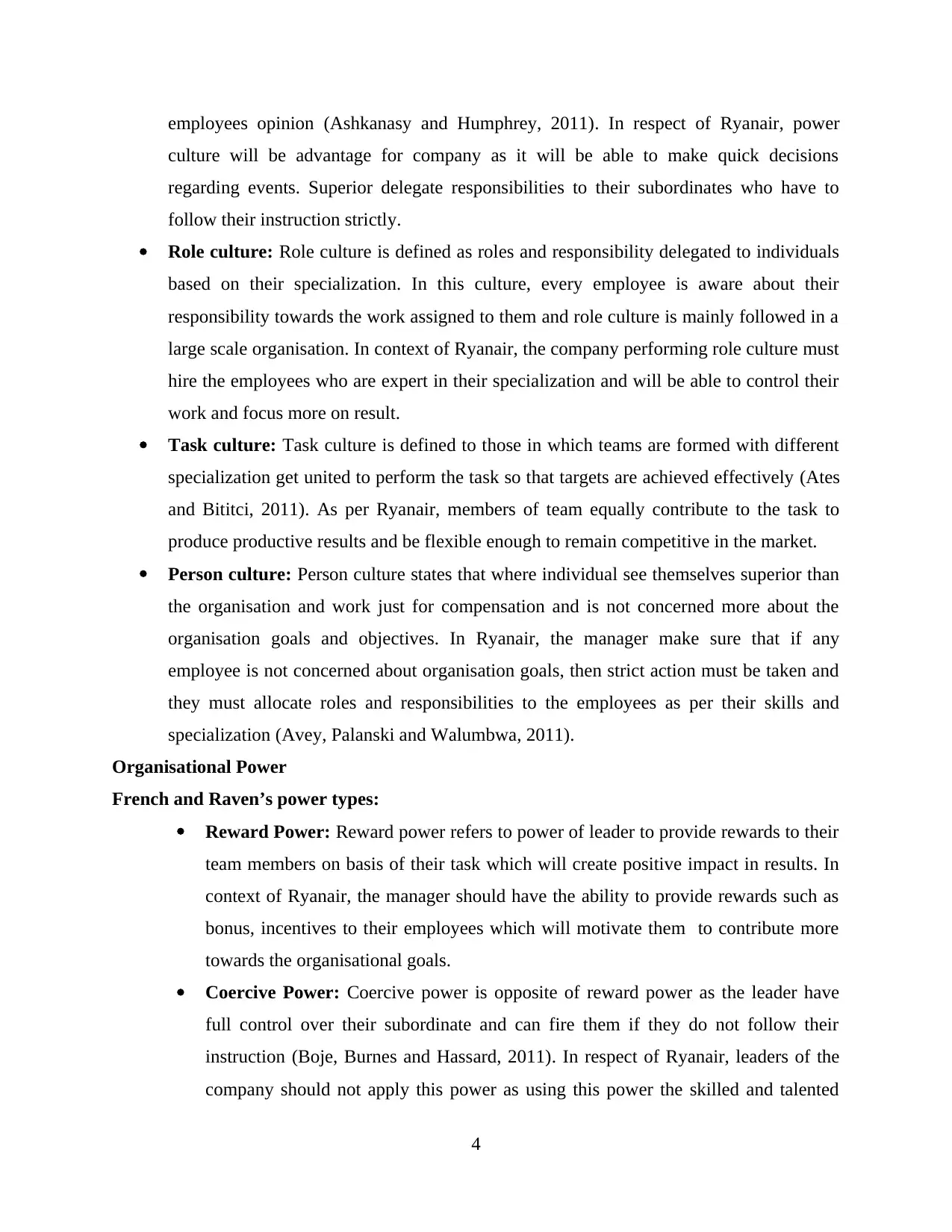
employees opinion (Ashkanasy and Humphrey, 2011). In respect of Ryanair, power
culture will be advantage for company as it will be able to make quick decisions
regarding events. Superior delegate responsibilities to their subordinates who have to
follow their instruction strictly.
Role culture: Role culture is defined as roles and responsibility delegated to individuals
based on their specialization. In this culture, every employee is aware about their
responsibility towards the work assigned to them and role culture is mainly followed in a
large scale organisation. In context of Ryanair, the company performing role culture must
hire the employees who are expert in their specialization and will be able to control their
work and focus more on result.
Task culture: Task culture is defined to those in which teams are formed with different
specialization get united to perform the task so that targets are achieved effectively (Ates
and Bititci, 2011). As per Ryanair, members of team equally contribute to the task to
produce productive results and be flexible enough to remain competitive in the market.
Person culture: Person culture states that where individual see themselves superior than
the organisation and work just for compensation and is not concerned more about the
organisation goals and objectives. In Ryanair, the manager make sure that if any
employee is not concerned about organisation goals, then strict action must be taken and
they must allocate roles and responsibilities to the employees as per their skills and
specialization (Avey, Palanski and Walumbwa, 2011).
Organisational Power
French and Raven’s power types:
Reward Power: Reward power refers to power of leader to provide rewards to their
team members on basis of their task which will create positive impact in results. In
context of Ryanair, the manager should have the ability to provide rewards such as
bonus, incentives to their employees which will motivate them to contribute more
towards the organisational goals.
Coercive Power: Coercive power is opposite of reward power as the leader have
full control over their subordinate and can fire them if they do not follow their
instruction (Boje, Burnes and Hassard, 2011). In respect of Ryanair, leaders of the
company should not apply this power as using this power the skilled and talented
4
culture will be advantage for company as it will be able to make quick decisions
regarding events. Superior delegate responsibilities to their subordinates who have to
follow their instruction strictly.
Role culture: Role culture is defined as roles and responsibility delegated to individuals
based on their specialization. In this culture, every employee is aware about their
responsibility towards the work assigned to them and role culture is mainly followed in a
large scale organisation. In context of Ryanair, the company performing role culture must
hire the employees who are expert in their specialization and will be able to control their
work and focus more on result.
Task culture: Task culture is defined to those in which teams are formed with different
specialization get united to perform the task so that targets are achieved effectively (Ates
and Bititci, 2011). As per Ryanair, members of team equally contribute to the task to
produce productive results and be flexible enough to remain competitive in the market.
Person culture: Person culture states that where individual see themselves superior than
the organisation and work just for compensation and is not concerned more about the
organisation goals and objectives. In Ryanair, the manager make sure that if any
employee is not concerned about organisation goals, then strict action must be taken and
they must allocate roles and responsibilities to the employees as per their skills and
specialization (Avey, Palanski and Walumbwa, 2011).
Organisational Power
French and Raven’s power types:
Reward Power: Reward power refers to power of leader to provide rewards to their
team members on basis of their task which will create positive impact in results. In
context of Ryanair, the manager should have the ability to provide rewards such as
bonus, incentives to their employees which will motivate them to contribute more
towards the organisational goals.
Coercive Power: Coercive power is opposite of reward power as the leader have
full control over their subordinate and can fire them if they do not follow their
instruction (Boje, Burnes and Hassard, 2011). In respect of Ryanair, leaders of the
company should not apply this power as using this power the skilled and talented
4
Secure Best Marks with AI Grader
Need help grading? Try our AI Grader for instant feedback on your assignments.
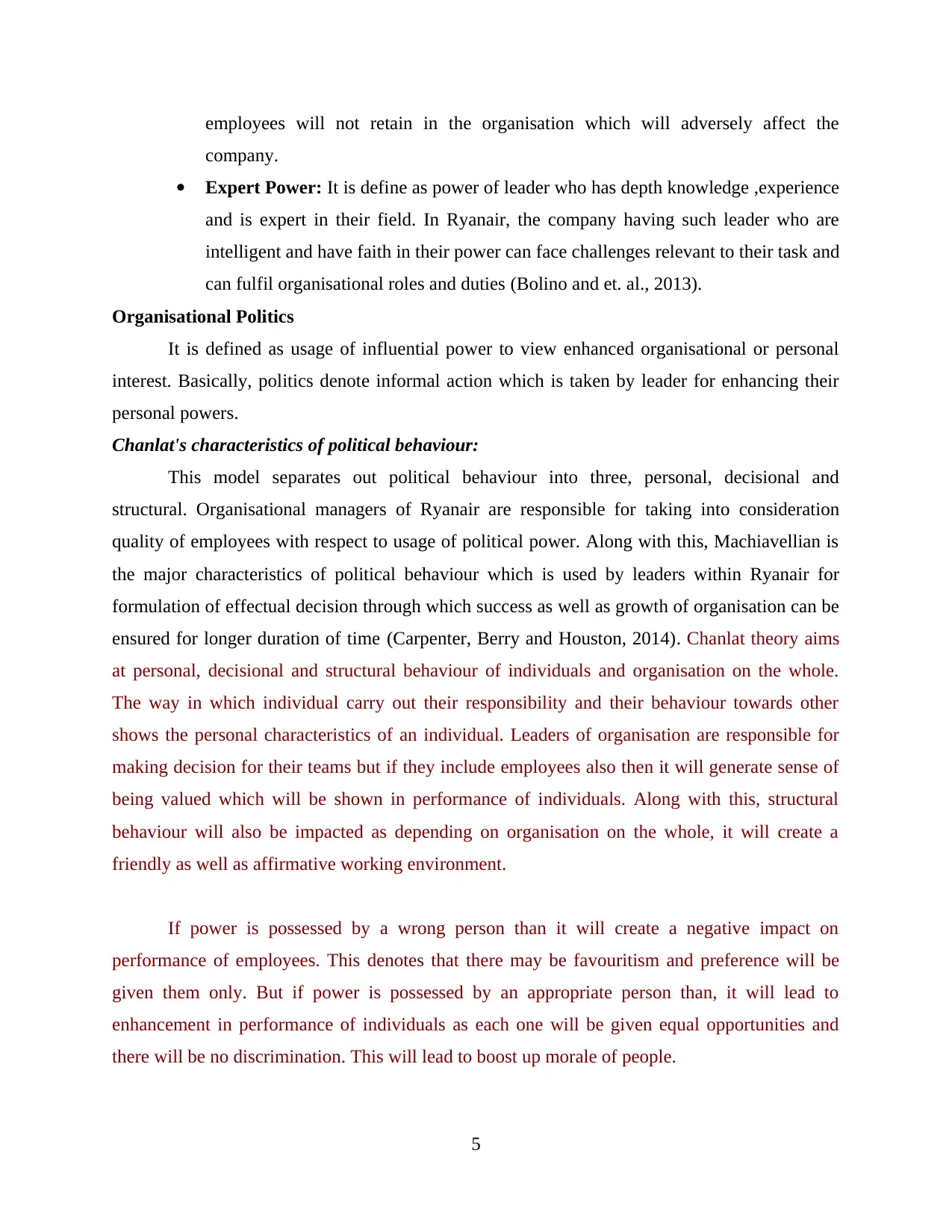
employees will not retain in the organisation which will adversely affect the
company.
Expert Power: It is define as power of leader who has depth knowledge ,experience
and is expert in their field. In Ryanair, the company having such leader who are
intelligent and have faith in their power can face challenges relevant to their task and
can fulfil organisational roles and duties (Bolino and et. al., 2013).
Organisational Politics
It is defined as usage of influential power to view enhanced organisational or personal
interest. Basically, politics denote informal action which is taken by leader for enhancing their
personal powers.
Chanlat's characteristics of political behaviour:
This model separates out political behaviour into three, personal, decisional and
structural. Organisational managers of Ryanair are responsible for taking into consideration
quality of employees with respect to usage of political power. Along with this, Machiavellian is
the major characteristics of political behaviour which is used by leaders within Ryanair for
formulation of effectual decision through which success as well as growth of organisation can be
ensured for longer duration of time (Carpenter, Berry and Houston, 2014). Chanlat theory aims
at personal, decisional and structural behaviour of individuals and organisation on the whole.
The way in which individual carry out their responsibility and their behaviour towards other
shows the personal characteristics of an individual. Leaders of organisation are responsible for
making decision for their teams but if they include employees also then it will generate sense of
being valued which will be shown in performance of individuals. Along with this, structural
behaviour will also be impacted as depending on organisation on the whole, it will create a
friendly as well as affirmative working environment.
If power is possessed by a wrong person than it will create a negative impact on
performance of employees. This denotes that there may be favouritism and preference will be
given them only. But if power is possessed by an appropriate person than, it will lead to
enhancement in performance of individuals as each one will be given equal opportunities and
there will be no discrimination. This will lead to boost up morale of people.
5
company.
Expert Power: It is define as power of leader who has depth knowledge ,experience
and is expert in their field. In Ryanair, the company having such leader who are
intelligent and have faith in their power can face challenges relevant to their task and
can fulfil organisational roles and duties (Bolino and et. al., 2013).
Organisational Politics
It is defined as usage of influential power to view enhanced organisational or personal
interest. Basically, politics denote informal action which is taken by leader for enhancing their
personal powers.
Chanlat's characteristics of political behaviour:
This model separates out political behaviour into three, personal, decisional and
structural. Organisational managers of Ryanair are responsible for taking into consideration
quality of employees with respect to usage of political power. Along with this, Machiavellian is
the major characteristics of political behaviour which is used by leaders within Ryanair for
formulation of effectual decision through which success as well as growth of organisation can be
ensured for longer duration of time (Carpenter, Berry and Houston, 2014). Chanlat theory aims
at personal, decisional and structural behaviour of individuals and organisation on the whole.
The way in which individual carry out their responsibility and their behaviour towards other
shows the personal characteristics of an individual. Leaders of organisation are responsible for
making decision for their teams but if they include employees also then it will generate sense of
being valued which will be shown in performance of individuals. Along with this, structural
behaviour will also be impacted as depending on organisation on the whole, it will create a
friendly as well as affirmative working environment.
If power is possessed by a wrong person than it will create a negative impact on
performance of employees. This denotes that there may be favouritism and preference will be
given them only. But if power is possessed by an appropriate person than, it will lead to
enhancement in performance of individuals as each one will be given equal opportunities and
there will be no discrimination. This will lead to boost up morale of people.
5
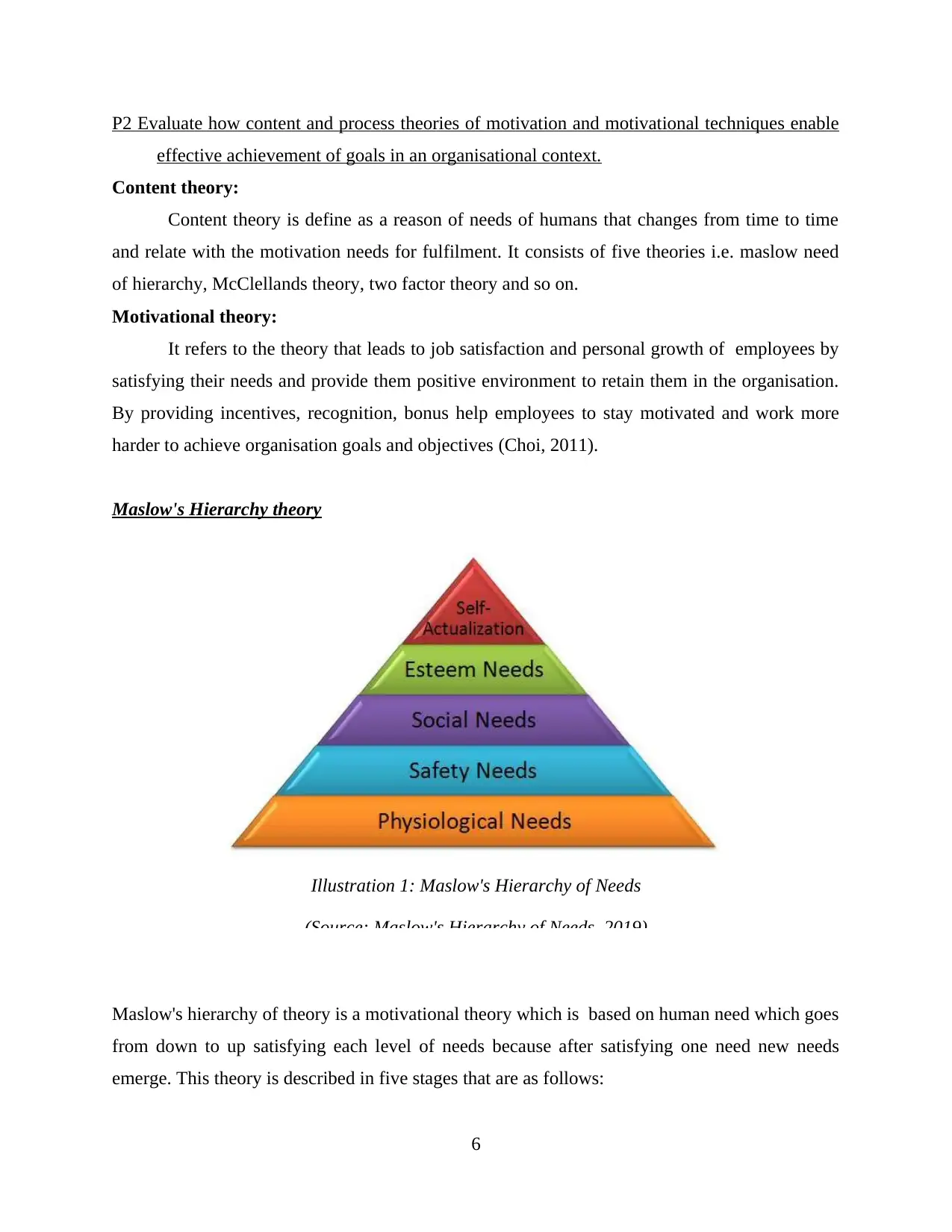
P2 Evaluate how content and process theories of motivation and motivational techniques enable
effective achievement of goals in an organisational context.
Content theory:
Content theory is define as a reason of needs of humans that changes from time to time
and relate with the motivation needs for fulfilment. It consists of five theories i.e. maslow need
of hierarchy, McClellands theory, two factor theory and so on.
Motivational theory:
It refers to the theory that leads to job satisfaction and personal growth of employees by
satisfying their needs and provide them positive environment to retain them in the organisation.
By providing incentives, recognition, bonus help employees to stay motivated and work more
harder to achieve organisation goals and objectives (Choi, 2011).
Maslow's Hierarchy theory
Maslow's hierarchy of theory is a motivational theory which is based on human need which goes
from down to up satisfying each level of needs because after satisfying one need new needs
emerge. This theory is described in five stages that are as follows:
6
Illustration 1: Maslow's Hierarchy of Needs
(Source: Maslow's Hierarchy of Needs. 2019)
effective achievement of goals in an organisational context.
Content theory:
Content theory is define as a reason of needs of humans that changes from time to time
and relate with the motivation needs for fulfilment. It consists of five theories i.e. maslow need
of hierarchy, McClellands theory, two factor theory and so on.
Motivational theory:
It refers to the theory that leads to job satisfaction and personal growth of employees by
satisfying their needs and provide them positive environment to retain them in the organisation.
By providing incentives, recognition, bonus help employees to stay motivated and work more
harder to achieve organisation goals and objectives (Choi, 2011).
Maslow's Hierarchy theory
Maslow's hierarchy of theory is a motivational theory which is based on human need which goes
from down to up satisfying each level of needs because after satisfying one need new needs
emerge. This theory is described in five stages that are as follows:
6
Illustration 1: Maslow's Hierarchy of Needs
(Source: Maslow's Hierarchy of Needs. 2019)
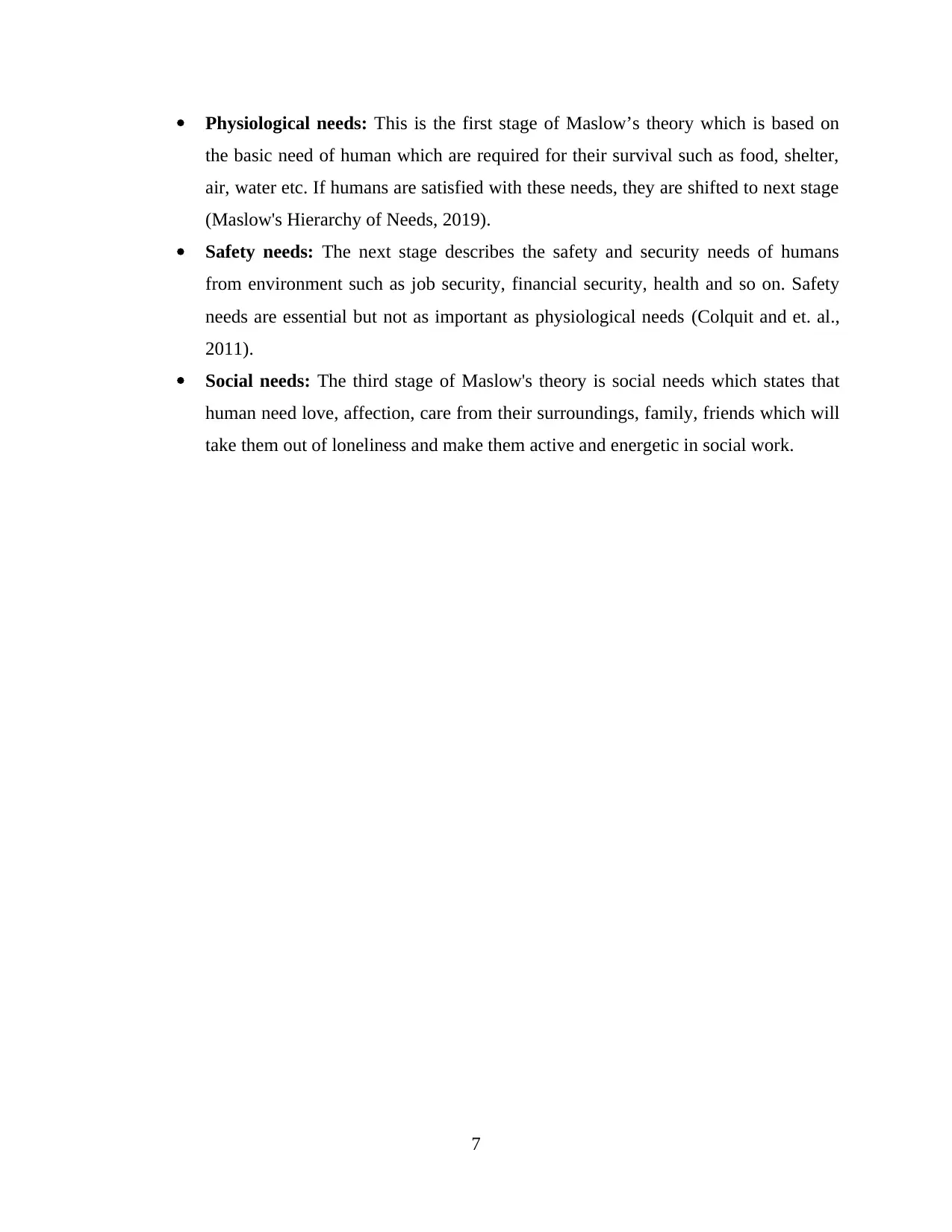
Physiological needs: This is the first stage of Maslow’s theory which is based on
the basic need of human which are required for their survival such as food, shelter,
air, water etc. If humans are satisfied with these needs, they are shifted to next stage
(Maslow's Hierarchy of Needs, 2019).
Safety needs: The next stage describes the safety and security needs of humans
from environment such as job security, financial security, health and so on. Safety
needs are essential but not as important as physiological needs (Colquit and et. al.,
2011).
Social needs: The third stage of Maslow's theory is social needs which states that
human need love, affection, care from their surroundings, family, friends which will
take them out of loneliness and make them active and energetic in social work.
7
the basic need of human which are required for their survival such as food, shelter,
air, water etc. If humans are satisfied with these needs, they are shifted to next stage
(Maslow's Hierarchy of Needs, 2019).
Safety needs: The next stage describes the safety and security needs of humans
from environment such as job security, financial security, health and so on. Safety
needs are essential but not as important as physiological needs (Colquit and et. al.,
2011).
Social needs: The third stage of Maslow's theory is social needs which states that
human need love, affection, care from their surroundings, family, friends which will
take them out of loneliness and make them active and energetic in social work.
7
Paraphrase This Document
Need a fresh take? Get an instant paraphrase of this document with our AI Paraphraser
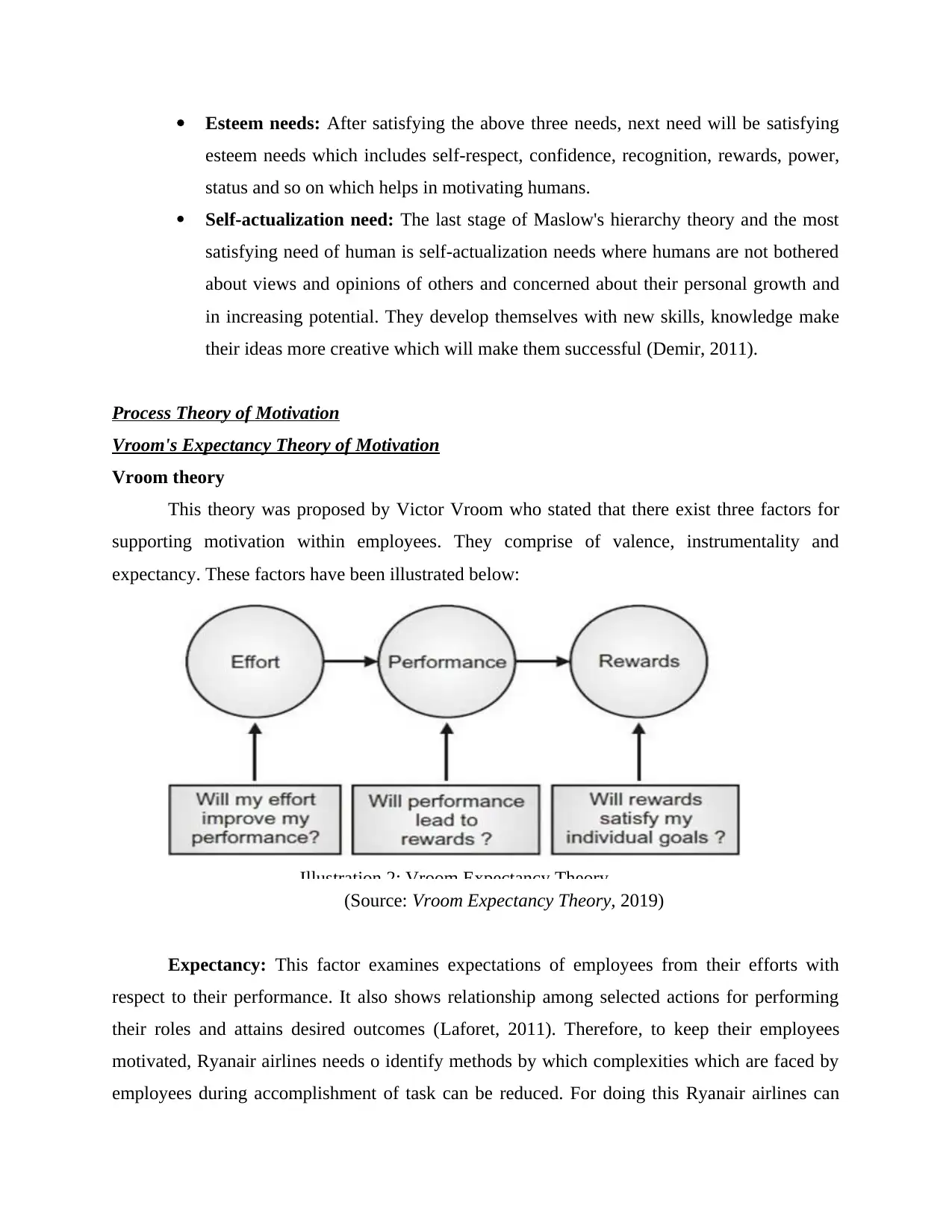
Esteem needs: After satisfying the above three needs, next need will be satisfying
esteem needs which includes self-respect, confidence, recognition, rewards, power,
status and so on which helps in motivating humans.
Self-actualization need: The last stage of Maslow's hierarchy theory and the most
satisfying need of human is self-actualization needs where humans are not bothered
about views and opinions of others and concerned about their personal growth and
in increasing potential. They develop themselves with new skills, knowledge make
their ideas more creative which will make them successful (Demir, 2011).
Process Theory of Motivation
Vroom's Expectancy Theory of Motivation
Vroom theory
This theory was proposed by Victor Vroom who stated that there exist three factors for
supporting motivation within employees. They comprise of valence, instrumentality and
expectancy. These factors have been illustrated below:
Illustration 2: Vroom Expectancy Theory
(Source: Vroom Expectancy Theory, 2019)
Expectancy: This factor examines expectations of employees from their efforts with
respect to their performance. It also shows relationship among selected actions for performing
their roles and attains desired outcomes (Laforet, 2011). Therefore, to keep their employees
motivated, Ryanair airlines needs o identify methods by which complexities which are faced by
employees during accomplishment of task can be reduced. For doing this Ryanair airlines can
esteem needs which includes self-respect, confidence, recognition, rewards, power,
status and so on which helps in motivating humans.
Self-actualization need: The last stage of Maslow's hierarchy theory and the most
satisfying need of human is self-actualization needs where humans are not bothered
about views and opinions of others and concerned about their personal growth and
in increasing potential. They develop themselves with new skills, knowledge make
their ideas more creative which will make them successful (Demir, 2011).
Process Theory of Motivation
Vroom's Expectancy Theory of Motivation
Vroom theory
This theory was proposed by Victor Vroom who stated that there exist three factors for
supporting motivation within employees. They comprise of valence, instrumentality and
expectancy. These factors have been illustrated below:
Illustration 2: Vroom Expectancy Theory
(Source: Vroom Expectancy Theory, 2019)
Expectancy: This factor examines expectations of employees from their efforts with
respect to their performance. It also shows relationship among selected actions for performing
their roles and attains desired outcomes (Laforet, 2011). Therefore, to keep their employees
motivated, Ryanair airlines needs o identify methods by which complexities which are faced by
employees during accomplishment of task can be reduced. For doing this Ryanair airlines can
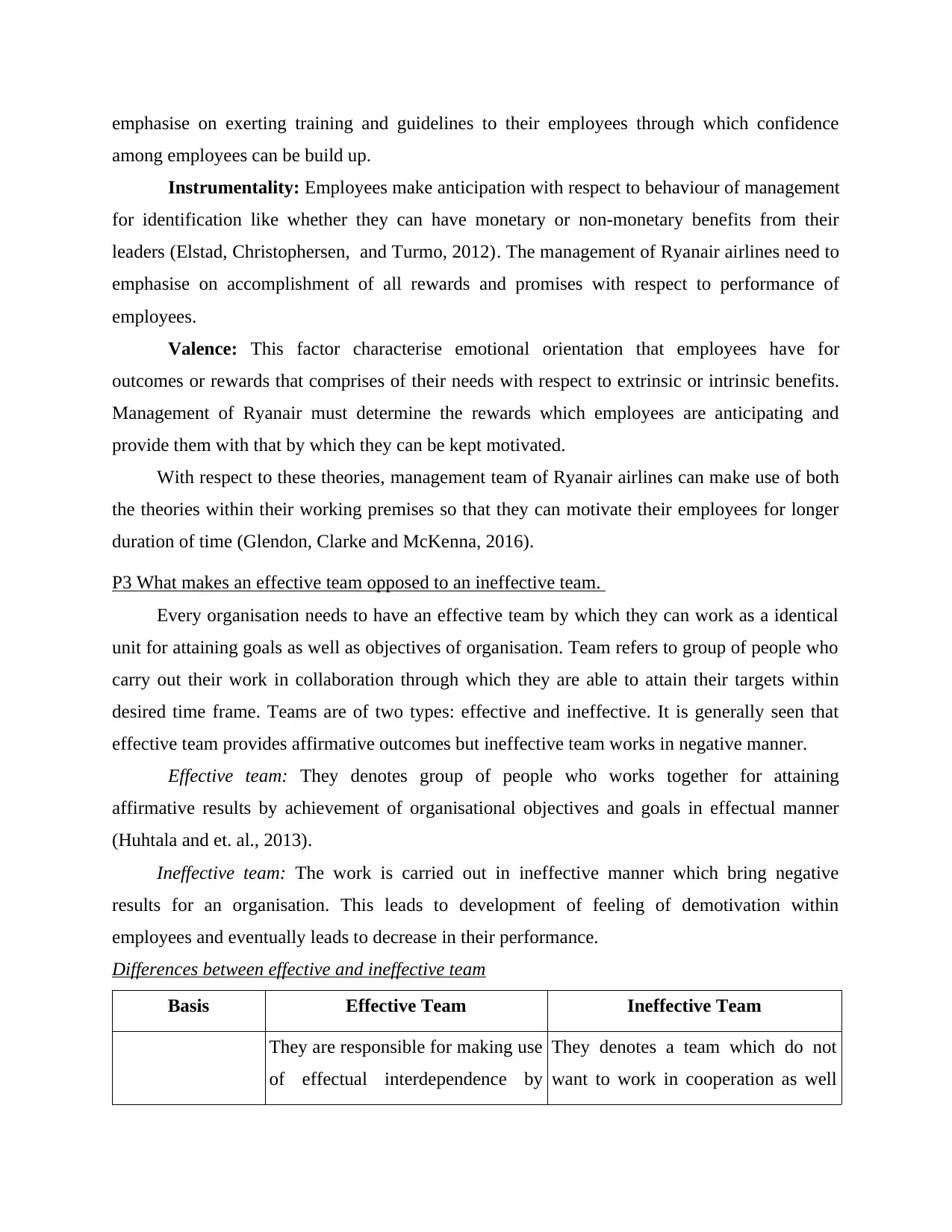
emphasise on exerting training and guidelines to their employees through which confidence
among employees can be build up.
Instrumentality: Employees make anticipation with respect to behaviour of management
for identification like whether they can have monetary or non-monetary benefits from their
leaders (Elstad, Christophersen, and Turmo, 2012). The management of Ryanair airlines need to
emphasise on accomplishment of all rewards and promises with respect to performance of
employees.
Valence: This factor characterise emotional orientation that employees have for
outcomes or rewards that comprises of their needs with respect to extrinsic or intrinsic benefits.
Management of Ryanair must determine the rewards which employees are anticipating and
provide them with that by which they can be kept motivated.
With respect to these theories, management team of Ryanair airlines can make use of both
the theories within their working premises so that they can motivate their employees for longer
duration of time (Glendon, Clarke and McKenna, 2016).
P3 What makes an effective team opposed to an ineffective team.
Every organisation needs to have an effective team by which they can work as a identical
unit for attaining goals as well as objectives of organisation. Team refers to group of people who
carry out their work in collaboration through which they are able to attain their targets within
desired time frame. Teams are of two types: effective and ineffective. It is generally seen that
effective team provides affirmative outcomes but ineffective team works in negative manner.
Effective team: They denotes group of people who works together for attaining
affirmative results by achievement of organisational objectives and goals in effectual manner
(Huhtala and et. al., 2013).
Ineffective team: The work is carried out in ineffective manner which bring negative
results for an organisation. This leads to development of feeling of demotivation within
employees and eventually leads to decrease in their performance.
Differences between effective and ineffective team
Basis Effective Team Ineffective Team
They are responsible for making use
of effectual interdependence by
They denotes a team which do not
want to work in cooperation as well
among employees can be build up.
Instrumentality: Employees make anticipation with respect to behaviour of management
for identification like whether they can have monetary or non-monetary benefits from their
leaders (Elstad, Christophersen, and Turmo, 2012). The management of Ryanair airlines need to
emphasise on accomplishment of all rewards and promises with respect to performance of
employees.
Valence: This factor characterise emotional orientation that employees have for
outcomes or rewards that comprises of their needs with respect to extrinsic or intrinsic benefits.
Management of Ryanair must determine the rewards which employees are anticipating and
provide them with that by which they can be kept motivated.
With respect to these theories, management team of Ryanair airlines can make use of both
the theories within their working premises so that they can motivate their employees for longer
duration of time (Glendon, Clarke and McKenna, 2016).
P3 What makes an effective team opposed to an ineffective team.
Every organisation needs to have an effective team by which they can work as a identical
unit for attaining goals as well as objectives of organisation. Team refers to group of people who
carry out their work in collaboration through which they are able to attain their targets within
desired time frame. Teams are of two types: effective and ineffective. It is generally seen that
effective team provides affirmative outcomes but ineffective team works in negative manner.
Effective team: They denotes group of people who works together for attaining
affirmative results by achievement of organisational objectives and goals in effectual manner
(Huhtala and et. al., 2013).
Ineffective team: The work is carried out in ineffective manner which bring negative
results for an organisation. This leads to development of feeling of demotivation within
employees and eventually leads to decrease in their performance.
Differences between effective and ineffective team
Basis Effective Team Ineffective Team
They are responsible for making use
of effectual interdependence by
They denotes a team which do not
want to work in cooperation as well
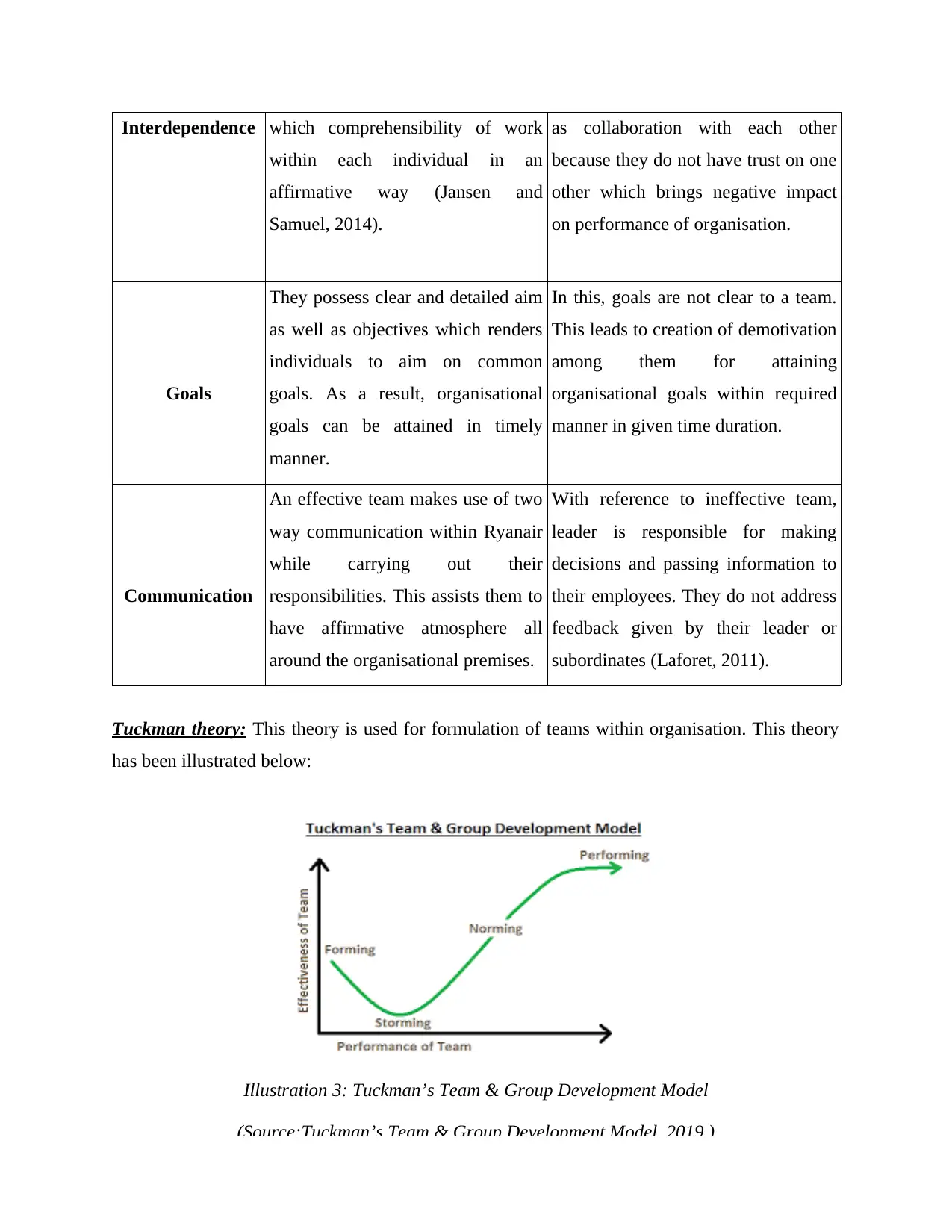
Interdependence which comprehensibility of work
within each individual in an
affirmative way (Jansen and
Samuel, 2014).
as collaboration with each other
because they do not have trust on one
other which brings negative impact
on performance of organisation.
Goals
They possess clear and detailed aim
as well as objectives which renders
individuals to aim on common
goals. As a result, organisational
goals can be attained in timely
manner.
In this, goals are not clear to a team.
This leads to creation of demotivation
among them for attaining
organisational goals within required
manner in given time duration.
Communication
An effective team makes use of two
way communication within Ryanair
while carrying out their
responsibilities. This assists them to
have affirmative atmosphere all
around the organisational premises.
With reference to ineffective team,
leader is responsible for making
decisions and passing information to
their employees. They do not address
feedback given by their leader or
subordinates (Laforet, 2011).
Tuckman theory: This theory is used for formulation of teams within organisation. This theory
has been illustrated below:
Illustration 3: Tuckman’s Team & Group Development Model
(Source:Tuckman’s Team & Group Development Model, 2019 )
within each individual in an
affirmative way (Jansen and
Samuel, 2014).
as collaboration with each other
because they do not have trust on one
other which brings negative impact
on performance of organisation.
Goals
They possess clear and detailed aim
as well as objectives which renders
individuals to aim on common
goals. As a result, organisational
goals can be attained in timely
manner.
In this, goals are not clear to a team.
This leads to creation of demotivation
among them for attaining
organisational goals within required
manner in given time duration.
Communication
An effective team makes use of two
way communication within Ryanair
while carrying out their
responsibilities. This assists them to
have affirmative atmosphere all
around the organisational premises.
With reference to ineffective team,
leader is responsible for making
decisions and passing information to
their employees. They do not address
feedback given by their leader or
subordinates (Laforet, 2011).
Tuckman theory: This theory is used for formulation of teams within organisation. This theory
has been illustrated below:
Illustration 3: Tuckman’s Team & Group Development Model
(Source:Tuckman’s Team & Group Development Model, 2019 )
Secure Best Marks with AI Grader
Need help grading? Try our AI Grader for instant feedback on your assignments.
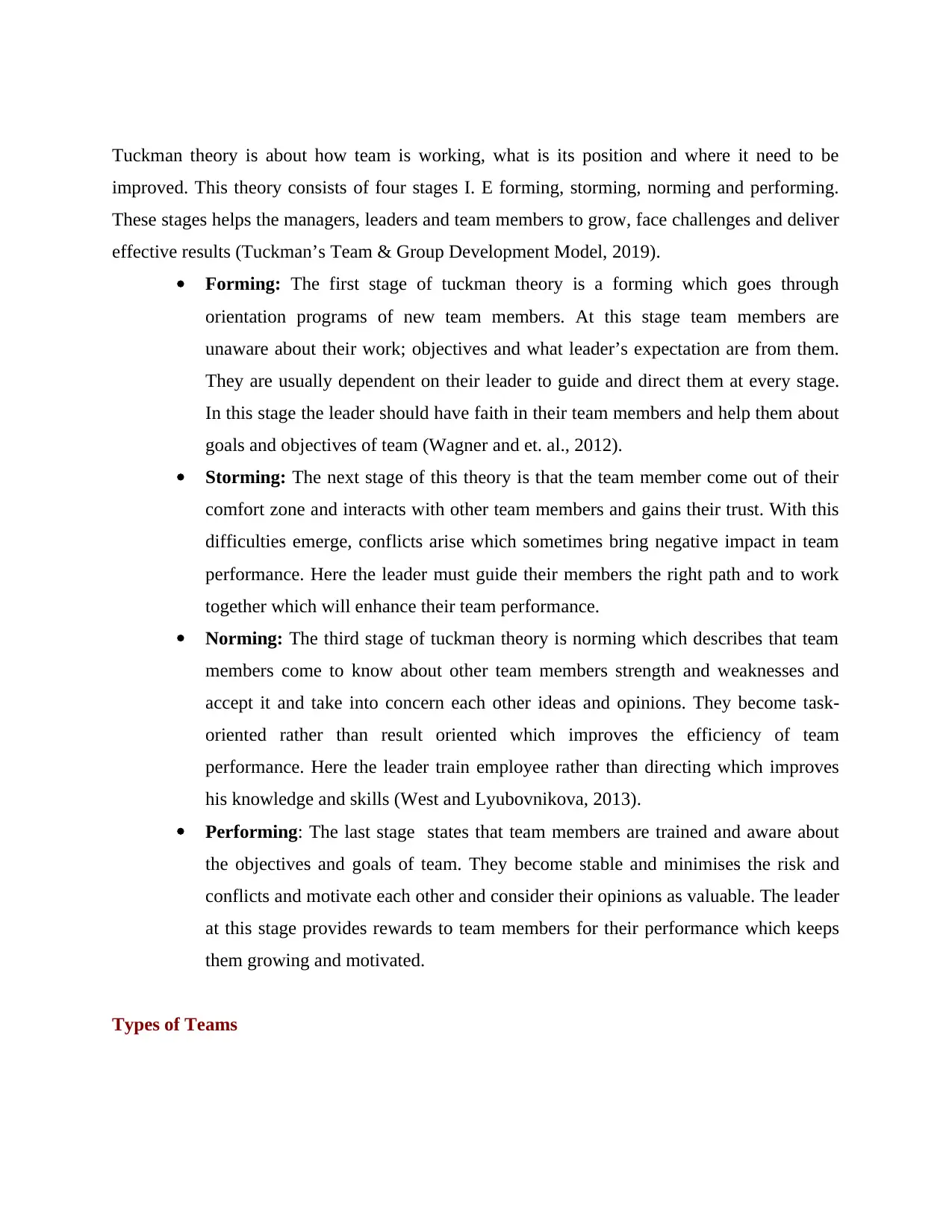
Tuckman theory is about how team is working, what is its position and where it need to be
improved. This theory consists of four stages I. E forming, storming, norming and performing.
These stages helps the managers, leaders and team members to grow, face challenges and deliver
effective results (Tuckman’s Team & Group Development Model, 2019).
Forming: The first stage of tuckman theory is a forming which goes through
orientation programs of new team members. At this stage team members are
unaware about their work; objectives and what leader’s expectation are from them.
They are usually dependent on their leader to guide and direct them at every stage.
In this stage the leader should have faith in their team members and help them about
goals and objectives of team (Wagner and et. al., 2012).
Storming: The next stage of this theory is that the team member come out of their
comfort zone and interacts with other team members and gains their trust. With this
difficulties emerge, conflicts arise which sometimes bring negative impact in team
performance. Here the leader must guide their members the right path and to work
together which will enhance their team performance.
Norming: The third stage of tuckman theory is norming which describes that team
members come to know about other team members strength and weaknesses and
accept it and take into concern each other ideas and opinions. They become task-
oriented rather than result oriented which improves the efficiency of team
performance. Here the leader train employee rather than directing which improves
his knowledge and skills (West and Lyubovnikova, 2013).
Performing: The last stage states that team members are trained and aware about
the objectives and goals of team. They become stable and minimises the risk and
conflicts and motivate each other and consider their opinions as valuable. The leader
at this stage provides rewards to team members for their performance which keeps
them growing and motivated.
Types of Teams
improved. This theory consists of four stages I. E forming, storming, norming and performing.
These stages helps the managers, leaders and team members to grow, face challenges and deliver
effective results (Tuckman’s Team & Group Development Model, 2019).
Forming: The first stage of tuckman theory is a forming which goes through
orientation programs of new team members. At this stage team members are
unaware about their work; objectives and what leader’s expectation are from them.
They are usually dependent on their leader to guide and direct them at every stage.
In this stage the leader should have faith in their team members and help them about
goals and objectives of team (Wagner and et. al., 2012).
Storming: The next stage of this theory is that the team member come out of their
comfort zone and interacts with other team members and gains their trust. With this
difficulties emerge, conflicts arise which sometimes bring negative impact in team
performance. Here the leader must guide their members the right path and to work
together which will enhance their team performance.
Norming: The third stage of tuckman theory is norming which describes that team
members come to know about other team members strength and weaknesses and
accept it and take into concern each other ideas and opinions. They become task-
oriented rather than result oriented which improves the efficiency of team
performance. Here the leader train employee rather than directing which improves
his knowledge and skills (West and Lyubovnikova, 2013).
Performing: The last stage states that team members are trained and aware about
the objectives and goals of team. They become stable and minimises the risk and
conflicts and motivate each other and consider their opinions as valuable. The leader
at this stage provides rewards to team members for their performance which keeps
them growing and motivated.
Types of Teams
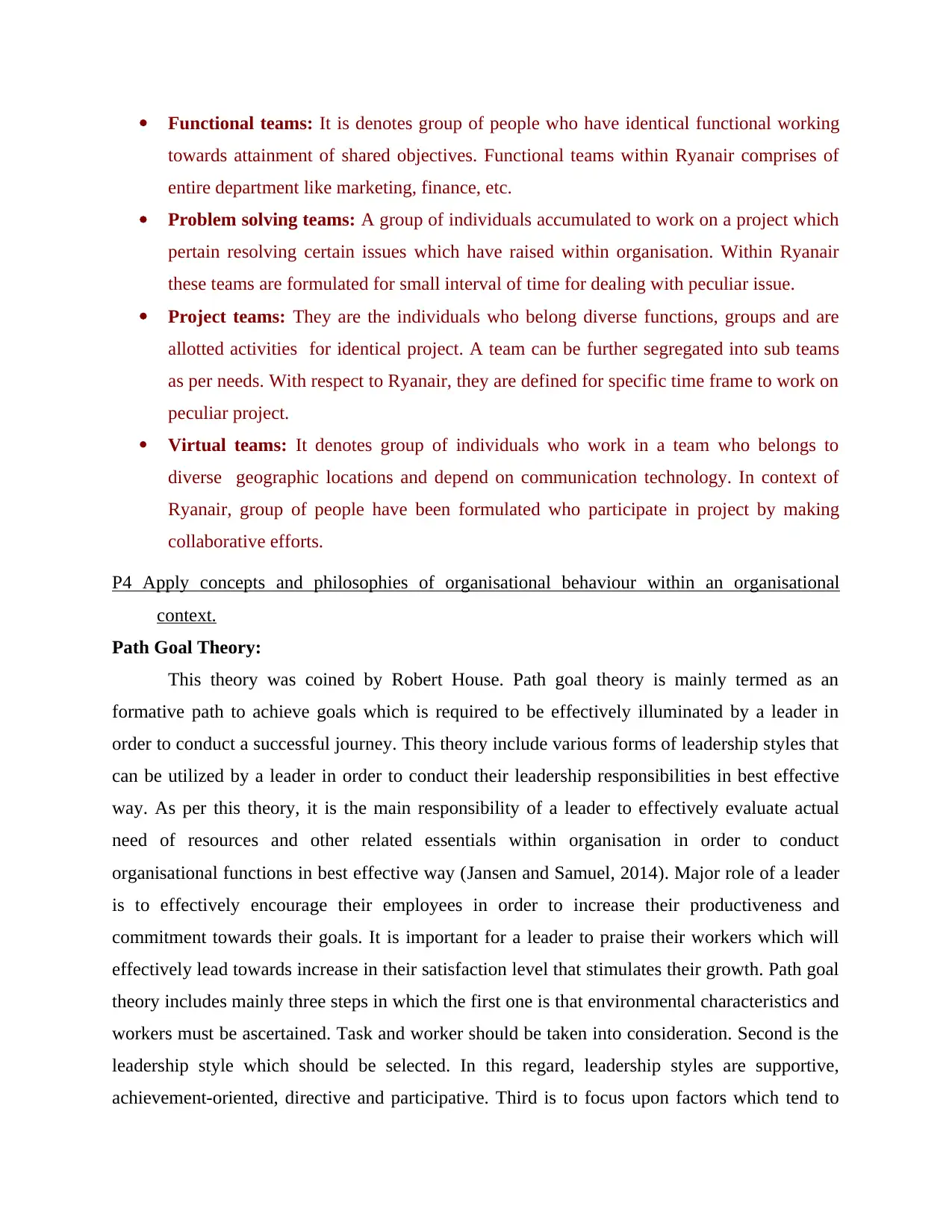
Functional teams: It is denotes group of people who have identical functional working
towards attainment of shared objectives. Functional teams within Ryanair comprises of
entire department like marketing, finance, etc.
Problem solving teams: A group of individuals accumulated to work on a project which
pertain resolving certain issues which have raised within organisation. Within Ryanair
these teams are formulated for small interval of time for dealing with peculiar issue.
Project teams: They are the individuals who belong diverse functions, groups and are
allotted activities for identical project. A team can be further segregated into sub teams
as per needs. With respect to Ryanair, they are defined for specific time frame to work on
peculiar project.
Virtual teams: It denotes group of individuals who work in a team who belongs to
diverse geographic locations and depend on communication technology. In context of
Ryanair, group of people have been formulated who participate in project by making
collaborative efforts.
P4 Apply concepts and philosophies of organisational behaviour within an organisational
context.
Path Goal Theory:
This theory was coined by Robert House. Path goal theory is mainly termed as an
formative path to achieve goals which is required to be effectively illuminated by a leader in
order to conduct a successful journey. This theory include various forms of leadership styles that
can be utilized by a leader in order to conduct their leadership responsibilities in best effective
way. As per this theory, it is the main responsibility of a leader to effectively evaluate actual
need of resources and other related essentials within organisation in order to conduct
organisational functions in best effective way (Jansen and Samuel, 2014). Major role of a leader
is to effectively encourage their employees in order to increase their productiveness and
commitment towards their goals. It is important for a leader to praise their workers which will
effectively lead towards increase in their satisfaction level that stimulates their growth. Path goal
theory includes mainly three steps in which the first one is that environmental characteristics and
workers must be ascertained. Task and worker should be taken into consideration. Second is the
leadership style which should be selected. In this regard, leadership styles are supportive,
achievement-oriented, directive and participative. Third is to focus upon factors which tend to
towards attainment of shared objectives. Functional teams within Ryanair comprises of
entire department like marketing, finance, etc.
Problem solving teams: A group of individuals accumulated to work on a project which
pertain resolving certain issues which have raised within organisation. Within Ryanair
these teams are formulated for small interval of time for dealing with peculiar issue.
Project teams: They are the individuals who belong diverse functions, groups and are
allotted activities for identical project. A team can be further segregated into sub teams
as per needs. With respect to Ryanair, they are defined for specific time frame to work on
peculiar project.
Virtual teams: It denotes group of individuals who work in a team who belongs to
diverse geographic locations and depend on communication technology. In context of
Ryanair, group of people have been formulated who participate in project by making
collaborative efforts.
P4 Apply concepts and philosophies of organisational behaviour within an organisational
context.
Path Goal Theory:
This theory was coined by Robert House. Path goal theory is mainly termed as an
formative path to achieve goals which is required to be effectively illuminated by a leader in
order to conduct a successful journey. This theory include various forms of leadership styles that
can be utilized by a leader in order to conduct their leadership responsibilities in best effective
way. As per this theory, it is the main responsibility of a leader to effectively evaluate actual
need of resources and other related essentials within organisation in order to conduct
organisational functions in best effective way (Jansen and Samuel, 2014). Major role of a leader
is to effectively encourage their employees in order to increase their productiveness and
commitment towards their goals. It is important for a leader to praise their workers which will
effectively lead towards increase in their satisfaction level that stimulates their growth. Path goal
theory includes mainly three steps in which the first one is that environmental characteristics and
workers must be ascertained. Task and worker should be taken into consideration. Second is the
leadership style which should be selected. In this regard, leadership styles are supportive,
achievement-oriented, directive and participative. Third is to focus upon factors which tend to
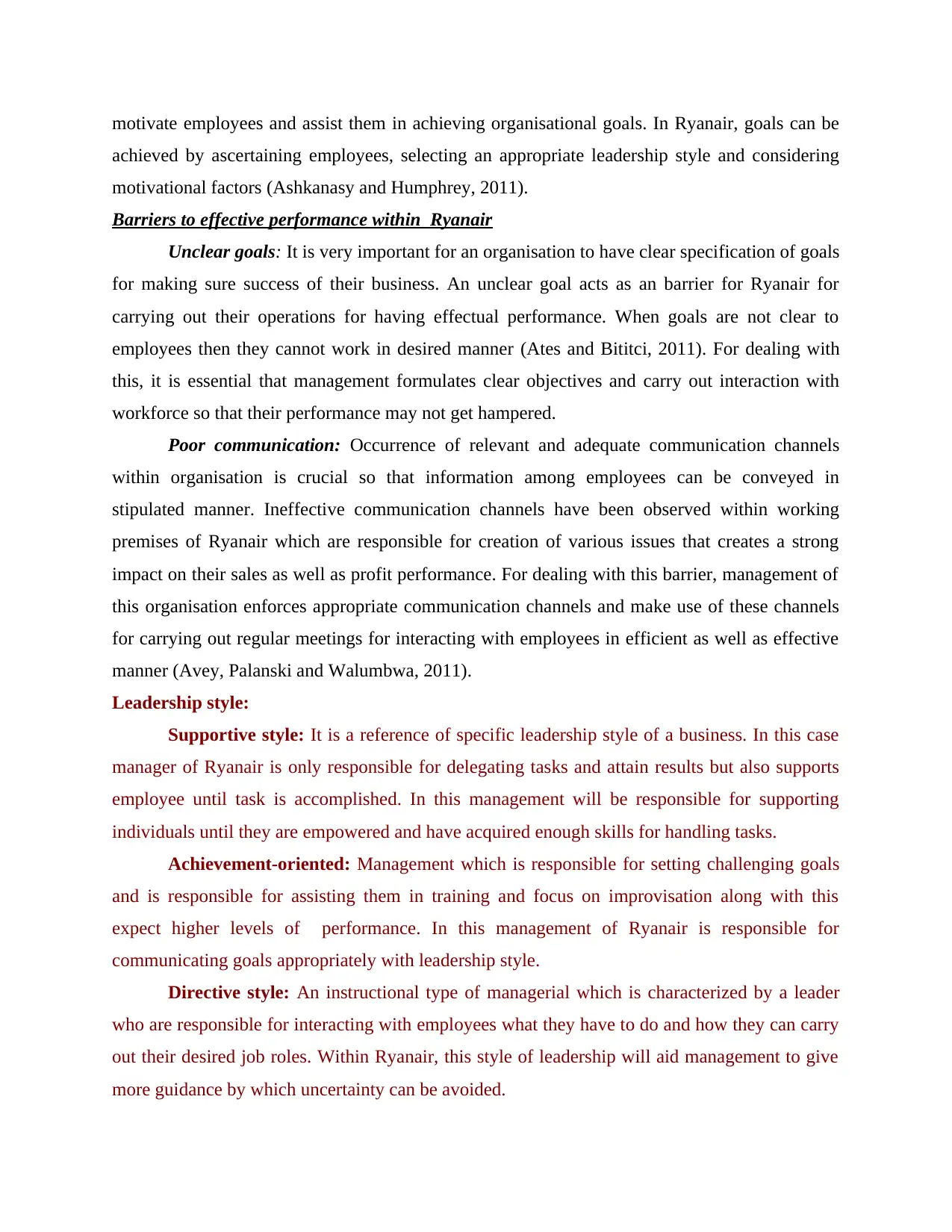
motivate employees and assist them in achieving organisational goals. In Ryanair, goals can be
achieved by ascertaining employees, selecting an appropriate leadership style and considering
motivational factors (Ashkanasy and Humphrey, 2011).
Barriers to effective performance within Ryanair
Unclear goals: It is very important for an organisation to have clear specification of goals
for making sure success of their business. An unclear goal acts as an barrier for Ryanair for
carrying out their operations for having effectual performance. When goals are not clear to
employees then they cannot work in desired manner (Ates and Bititci, 2011). For dealing with
this, it is essential that management formulates clear objectives and carry out interaction with
workforce so that their performance may not get hampered.
Poor communication: Occurrence of relevant and adequate communication channels
within organisation is crucial so that information among employees can be conveyed in
stipulated manner. Ineffective communication channels have been observed within working
premises of Ryanair which are responsible for creation of various issues that creates a strong
impact on their sales as well as profit performance. For dealing with this barrier, management of
this organisation enforces appropriate communication channels and make use of these channels
for carrying out regular meetings for interacting with employees in efficient as well as effective
manner (Avey, Palanski and Walumbwa, 2011).
Leadership style:
Supportive style: It is a reference of specific leadership style of a business. In this case
manager of Ryanair is only responsible for delegating tasks and attain results but also supports
employee until task is accomplished. In this management will be responsible for supporting
individuals until they are empowered and have acquired enough skills for handling tasks.
Achievement-oriented: Management which is responsible for setting challenging goals
and is responsible for assisting them in training and focus on improvisation along with this
expect higher levels of performance. In this management of Ryanair is responsible for
communicating goals appropriately with leadership style.
Directive style: An instructional type of managerial which is characterized by a leader
who are responsible for interacting with employees what they have to do and how they can carry
out their desired job roles. Within Ryanair, this style of leadership will aid management to give
more guidance by which uncertainty can be avoided.
achieved by ascertaining employees, selecting an appropriate leadership style and considering
motivational factors (Ashkanasy and Humphrey, 2011).
Barriers to effective performance within Ryanair
Unclear goals: It is very important for an organisation to have clear specification of goals
for making sure success of their business. An unclear goal acts as an barrier for Ryanair for
carrying out their operations for having effectual performance. When goals are not clear to
employees then they cannot work in desired manner (Ates and Bititci, 2011). For dealing with
this, it is essential that management formulates clear objectives and carry out interaction with
workforce so that their performance may not get hampered.
Poor communication: Occurrence of relevant and adequate communication channels
within organisation is crucial so that information among employees can be conveyed in
stipulated manner. Ineffective communication channels have been observed within working
premises of Ryanair which are responsible for creation of various issues that creates a strong
impact on their sales as well as profit performance. For dealing with this barrier, management of
this organisation enforces appropriate communication channels and make use of these channels
for carrying out regular meetings for interacting with employees in efficient as well as effective
manner (Avey, Palanski and Walumbwa, 2011).
Leadership style:
Supportive style: It is a reference of specific leadership style of a business. In this case
manager of Ryanair is only responsible for delegating tasks and attain results but also supports
employee until task is accomplished. In this management will be responsible for supporting
individuals until they are empowered and have acquired enough skills for handling tasks.
Achievement-oriented: Management which is responsible for setting challenging goals
and is responsible for assisting them in training and focus on improvisation along with this
expect higher levels of performance. In this management of Ryanair is responsible for
communicating goals appropriately with leadership style.
Directive style: An instructional type of managerial which is characterized by a leader
who are responsible for interacting with employees what they have to do and how they can carry
out their desired job roles. Within Ryanair, this style of leadership will aid management to give
more guidance by which uncertainty can be avoided.
Paraphrase This Document
Need a fresh take? Get an instant paraphrase of this document with our AI Paraphraser
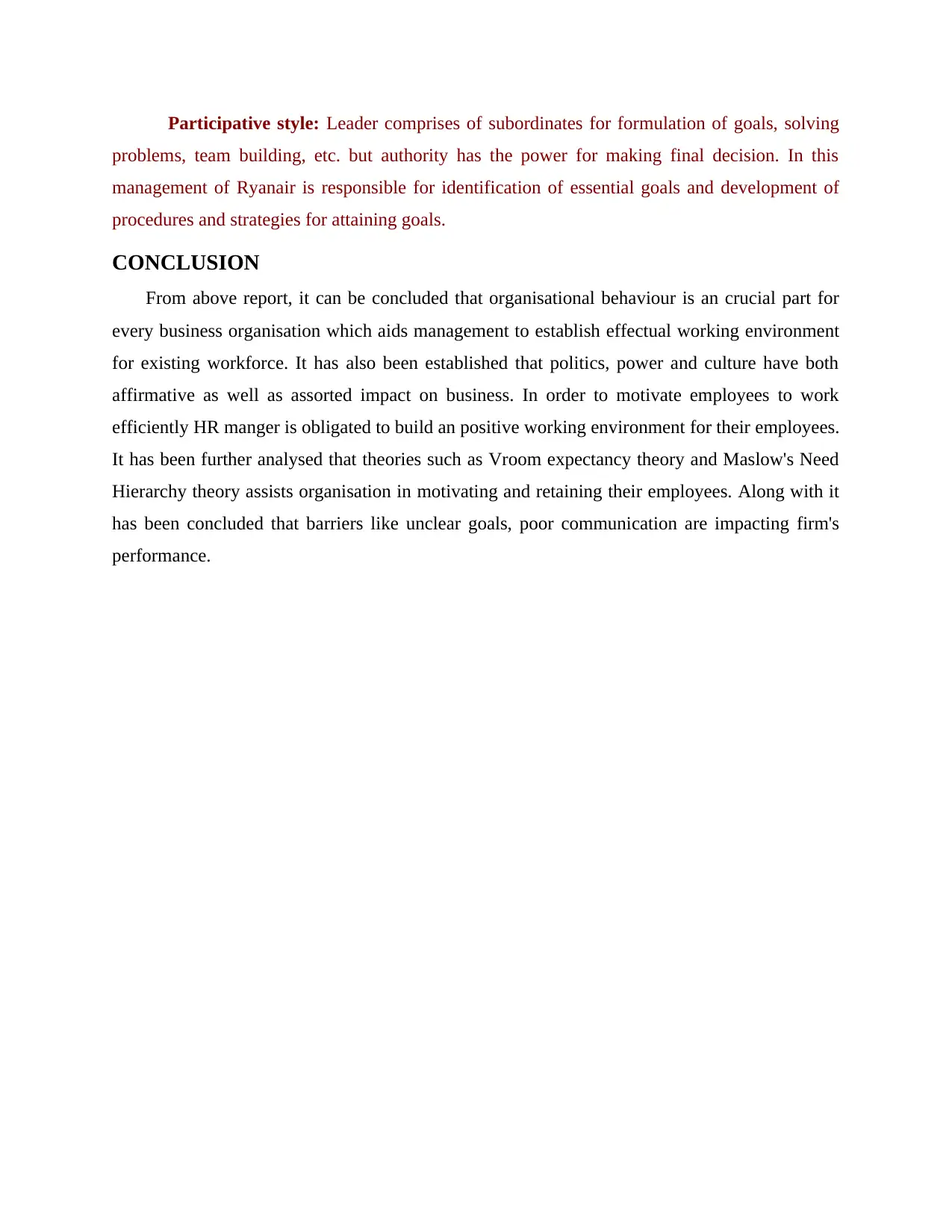
Participative style: Leader comprises of subordinates for formulation of goals, solving
problems, team building, etc. but authority has the power for making final decision. In this
management of Ryanair is responsible for identification of essential goals and development of
procedures and strategies for attaining goals.
CONCLUSION
From above report, it can be concluded that organisational behaviour is an crucial part for
every business organisation which aids management to establish effectual working environment
for existing workforce. It has also been established that politics, power and culture have both
affirmative as well as assorted impact on business. In order to motivate employees to work
efficiently HR manger is obligated to build an positive working environment for their employees.
It has been further analysed that theories such as Vroom expectancy theory and Maslow's Need
Hierarchy theory assists organisation in motivating and retaining their employees. Along with it
has been concluded that barriers like unclear goals, poor communication are impacting firm's
performance.
problems, team building, etc. but authority has the power for making final decision. In this
management of Ryanair is responsible for identification of essential goals and development of
procedures and strategies for attaining goals.
CONCLUSION
From above report, it can be concluded that organisational behaviour is an crucial part for
every business organisation which aids management to establish effectual working environment
for existing workforce. It has also been established that politics, power and culture have both
affirmative as well as assorted impact on business. In order to motivate employees to work
efficiently HR manger is obligated to build an positive working environment for their employees.
It has been further analysed that theories such as Vroom expectancy theory and Maslow's Need
Hierarchy theory assists organisation in motivating and retaining their employees. Along with it
has been concluded that barriers like unclear goals, poor communication are impacting firm's
performance.
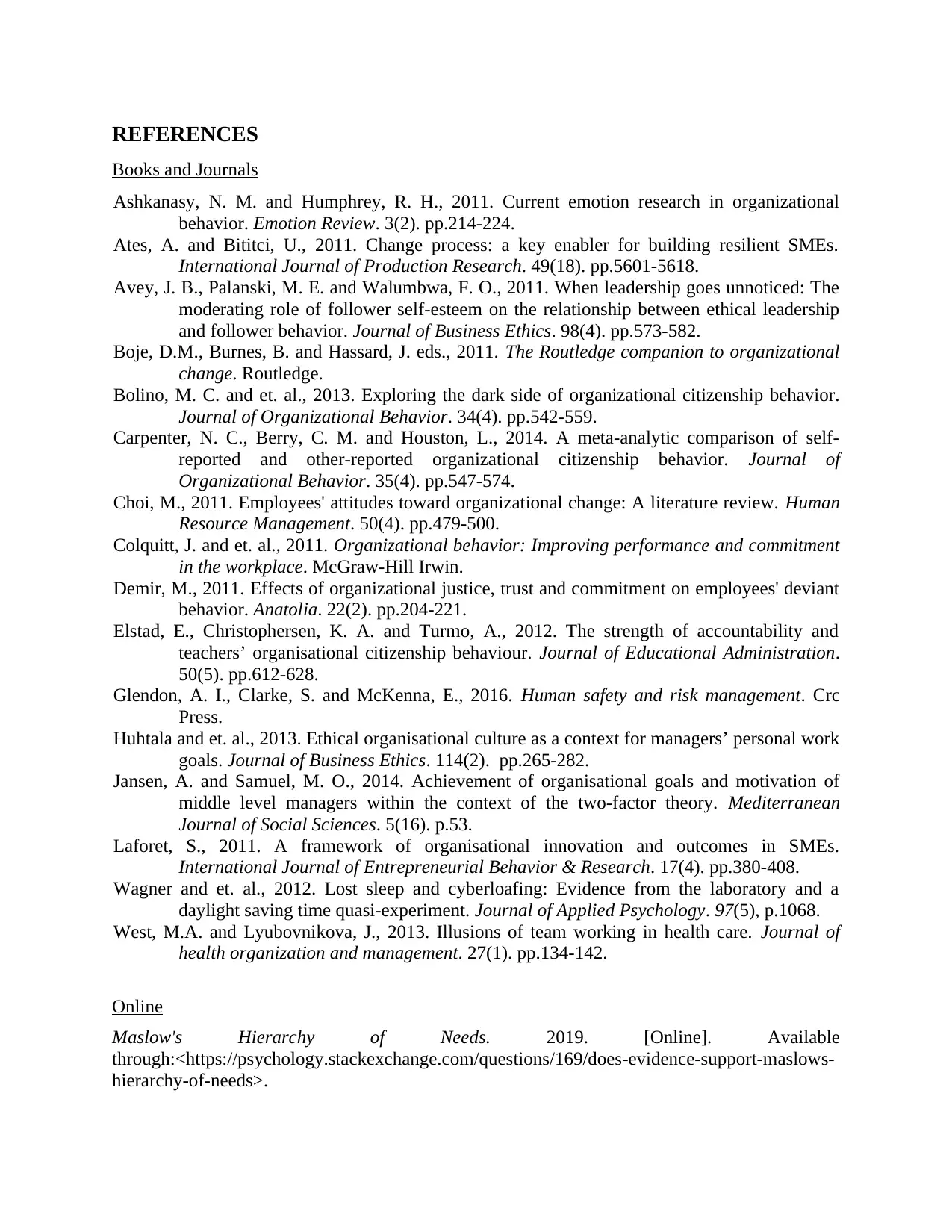
REFERENCES
Books and Journals
Ashkanasy, N. M. and Humphrey, R. H., 2011. Current emotion research in organizational
behavior. Emotion Review. 3(2). pp.214-224.
Ates, A. and Bititci, U., 2011. Change process: a key enabler for building resilient SMEs.
International Journal of Production Research. 49(18). pp.5601-5618.
Avey, J. B., Palanski, M. E. and Walumbwa, F. O., 2011. When leadership goes unnoticed: The
moderating role of follower self-esteem on the relationship between ethical leadership
and follower behavior. Journal of Business Ethics. 98(4). pp.573-582.
Boje, D.M., Burnes, B. and Hassard, J. eds., 2011. The Routledge companion to organizational
change. Routledge.
Bolino, M. C. and et. al., 2013. Exploring the dark side of organizational citizenship behavior.
Journal of Organizational Behavior. 34(4). pp.542-559.
Carpenter, N. C., Berry, C. M. and Houston, L., 2014. A meta‐analytic comparison of self‐
reported and other‐reported organizational citizenship behavior. Journal of
Organizational Behavior. 35(4). pp.547-574.
Choi, M., 2011. Employees' attitudes toward organizational change: A literature review. Human
Resource Management. 50(4). pp.479-500.
Colquitt, J. and et. al., 2011. Organizational behavior: Improving performance and commitment
in the workplace. McGraw-Hill Irwin.
Demir, M., 2011. Effects of organizational justice, trust and commitment on employees' deviant
behavior. Anatolia. 22(2). pp.204-221.
Elstad, E., Christophersen, K. A. and Turmo, A., 2012. The strength of accountability and
teachers’ organisational citizenship behaviour. Journal of Educational Administration.
50(5). pp.612-628.
Glendon, A. I., Clarke, S. and McKenna, E., 2016. Human safety and risk management. Crc
Press.
Huhtala and et. al., 2013. Ethical organisational culture as a context for managers’ personal work
goals. Journal of Business Ethics. 114(2). pp.265-282.
Jansen, A. and Samuel, M. O., 2014. Achievement of organisational goals and motivation of
middle level managers within the context of the two-factor theory. Mediterranean
Journal of Social Sciences. 5(16). p.53.
Laforet, S., 2011. A framework of organisational innovation and outcomes in SMEs.
International Journal of Entrepreneurial Behavior & Research. 17(4). pp.380-408.
Wagner and et. al., 2012. Lost sleep and cyberloafing: Evidence from the laboratory and a
daylight saving time quasi-experiment. Journal of Applied Psychology. 97(5), p.1068.
West, M.A. and Lyubovnikova, J., 2013. Illusions of team working in health care. Journal of
health organization and management. 27(1). pp.134-142.
Online
Maslow's Hierarchy of Needs. 2019. [Online]. Available
through:<https://psychology.stackexchange.com/questions/169/does-evidence-support-maslows-
hierarchy-of-needs>.
Books and Journals
Ashkanasy, N. M. and Humphrey, R. H., 2011. Current emotion research in organizational
behavior. Emotion Review. 3(2). pp.214-224.
Ates, A. and Bititci, U., 2011. Change process: a key enabler for building resilient SMEs.
International Journal of Production Research. 49(18). pp.5601-5618.
Avey, J. B., Palanski, M. E. and Walumbwa, F. O., 2011. When leadership goes unnoticed: The
moderating role of follower self-esteem on the relationship between ethical leadership
and follower behavior. Journal of Business Ethics. 98(4). pp.573-582.
Boje, D.M., Burnes, B. and Hassard, J. eds., 2011. The Routledge companion to organizational
change. Routledge.
Bolino, M. C. and et. al., 2013. Exploring the dark side of organizational citizenship behavior.
Journal of Organizational Behavior. 34(4). pp.542-559.
Carpenter, N. C., Berry, C. M. and Houston, L., 2014. A meta‐analytic comparison of self‐
reported and other‐reported organizational citizenship behavior. Journal of
Organizational Behavior. 35(4). pp.547-574.
Choi, M., 2011. Employees' attitudes toward organizational change: A literature review. Human
Resource Management. 50(4). pp.479-500.
Colquitt, J. and et. al., 2011. Organizational behavior: Improving performance and commitment
in the workplace. McGraw-Hill Irwin.
Demir, M., 2011. Effects of organizational justice, trust and commitment on employees' deviant
behavior. Anatolia. 22(2). pp.204-221.
Elstad, E., Christophersen, K. A. and Turmo, A., 2012. The strength of accountability and
teachers’ organisational citizenship behaviour. Journal of Educational Administration.
50(5). pp.612-628.
Glendon, A. I., Clarke, S. and McKenna, E., 2016. Human safety and risk management. Crc
Press.
Huhtala and et. al., 2013. Ethical organisational culture as a context for managers’ personal work
goals. Journal of Business Ethics. 114(2). pp.265-282.
Jansen, A. and Samuel, M. O., 2014. Achievement of organisational goals and motivation of
middle level managers within the context of the two-factor theory. Mediterranean
Journal of Social Sciences. 5(16). p.53.
Laforet, S., 2011. A framework of organisational innovation and outcomes in SMEs.
International Journal of Entrepreneurial Behavior & Research. 17(4). pp.380-408.
Wagner and et. al., 2012. Lost sleep and cyberloafing: Evidence from the laboratory and a
daylight saving time quasi-experiment. Journal of Applied Psychology. 97(5), p.1068.
West, M.A. and Lyubovnikova, J., 2013. Illusions of team working in health care. Journal of
health organization and management. 27(1). pp.134-142.
Online
Maslow's Hierarchy of Needs. 2019. [Online]. Available
through:<https://psychology.stackexchange.com/questions/169/does-evidence-support-maslows-
hierarchy-of-needs>.
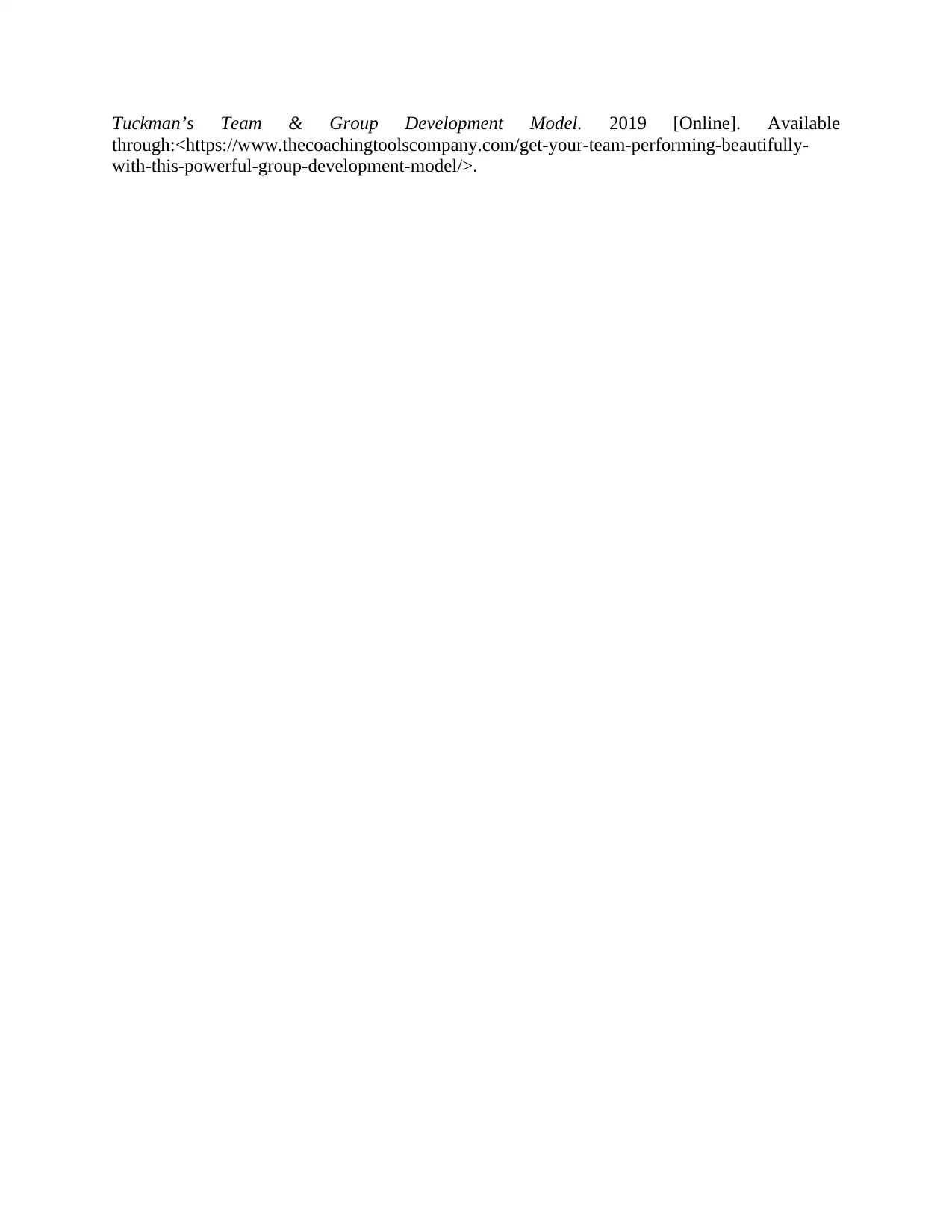
Tuckman’s Team & Group Development Model. 2019 [Online]. Available
through:<https://www.thecoachingtoolscompany.com/get-your-team-performing-beautifully-
with-this-powerful-group-development-model/>.
through:<https://www.thecoachingtoolscompany.com/get-your-team-performing-beautifully-
with-this-powerful-group-development-model/>.
1 out of 16
Related Documents
Your All-in-One AI-Powered Toolkit for Academic Success.
+13062052269
info@desklib.com
Available 24*7 on WhatsApp / Email
![[object Object]](/_next/static/media/star-bottom.7253800d.svg)
Unlock your academic potential
© 2024 | Zucol Services PVT LTD | All rights reserved.





